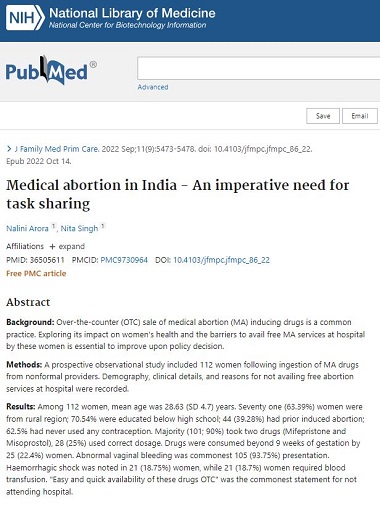
Background: Over-the-counter (OTC) sale of medical abortion (MA) inducing drugs is a common practice. Exploring its impact on women's health and the barriers to avail free MA services at hospital by these women is essential to improve upon policy decision.
Methods: A prospective observational study included 112 women following ingestion of MA drugs from nonformal providers. Demography, clinical details, and reasons for not availing free abortion services at hospital were recorded.
Results: Among 112 women, mean age was 28.63 (SD 4.7) years. Seventy one (63.39%) women were from rural region; 70.54% were educated below high school; 44 (39.28%) had prior induced abortion; 62.5% had never used any contraception. Majority (101; 90%) took two drugs (Mifepristone and Misoprostol), 28 (25%) used correct dosage. Drugs were consumed beyond 9 weeks of gestation by 25 (22.4%) women. Abnormal vaginal bleeding was commonest 105 (93.75%) presentation. Haemorrhagic shock was noted in 21 (18.75%) women, while 21 (18.7%) women required blood transfusion. "Easy and quick availability of these drugs OTC" was the commonest statement for not attending hospital.
Conclusion: Easy and quick availability of OTC drugs, distance to hospital were major barriers. Incorrect dosage and lack of gestational age calculation were two most common errors in the risk assessment protocol. Expanding provider base, by training midlevel providers, can overcome these and unmask the full potential of MA to make abortion safer.
Arora N, Singh N. Medical abortion in India - An imperative need for task sharing. J Family Med Prim Care. 2022 Sep;11(9):5473-5478